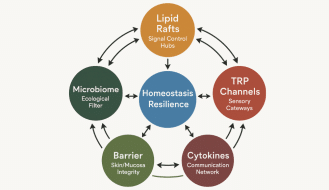What Your Cholesterol & Triglyceride Numbers Say About Your Lifestyle
Many years ago, a senior executive at a petroleum company came to me for his annual health checkup. Slightly overweight, he traveled regularly, didn’t have much time for exercise, and often he ate out. In addition, he smoked a couple of cigarettes daily.
Since he was in his late forties, he still hadn’t experienced any major medical problems. Still, he was concerned that he might have high cholesterol, and insisted it should be measured. This was before cholesterol-lowering statins were available on the market.
While I told him that we would take a blood sample as part of his exam, I asked him to consider the following question:
How would he respond to the results?
At first he didn’t understand my question. Then I asked, “If your cholesterol numbers are bad, will you be motivated to change your lifestyle and eating habits? However, what if your numbers are just fine? Will you still feel motivated to make changes?”
Cholesterol as an Indicator of Heart Health
In my years as a physician, this question is the crux of the preventive medicine matter. Most people are not willing to make lifestyle or diet changes until the damage is already done and their health is visibly in jeopardy.
This is particularly the case with heart health, where cholesterol – specifically the “bad” LDL cholesterol – serves as the champion health predictor. While LDL values are the most commonly used indicator for assessing heart health, many people with heart problems have normal cholesterol levels. Normal blood values could therefore instill a false sense of security, even if the patient is at a high risk for heart attack, stroke, or sudden death because of poor lifestyle choices and eating habits.
Measuring the Ratio of Triglycerides to HDL
During the last few years, several research reports have started examining different means of predicting heart health risk. By looking at other blood lipid values, researchers are finding that lifestyle and diet can have an impact on heart health at a very early stage. In a thought-provoking article in the Wall Street Journal, the headline read, “Children on Track for a Heart Attack”. According to a new study cited in the article, children as young as nine already showed signs of stiff arteries and high triglyceride levels – both symptoms of poor lifestyle and diet.
The article also pointed out that physicians should examine other blood values besides LDL cholesterol. Particularly, the ratio of triglycerides to good cholesterol (HDL) seemed to be a better means of assessing the risk of heart attack, stroke and sudden death. In fact, several studies have concluded that the ratio between triglycerides and HDL seems to be a more important predictor of heart disease than any other lipid measurement.
Improving Triglycerides and HDL Numbers with Fish Oil
We’ve been interested in the increased attention to triglycerides and HDL numbers because those values seem to be particularly affected by our Omega Cure® liquid fish oil. Customers routinely report that their triglycerides have dropped dramatically – often up to 50 percent – after taking three teaspoons of Omega Cure over an eight week period.
Looking at omega-3 fish oil research, these customer stories make sense. Studies show that consuming a high dose of omega-3 fish oil every day can lower high triglycerides by 25 to 50 percent.
The Benefits of Adding Fiber to an Omega-3 Regimen
Working on a different physiological mechanism than fish oil, fiber also seems to have a powerful impact on cholesterol numbers, particularly LDL levels. So what happens when fiber and fish oil act in synergy?
As early as 1997, a study from Case Western Reserve University found that while fish oil alone lowered triglyceride levels, the addition of fiber to the fish oil treatment dramatically decreased cholesterol and triglyceride numbers. In other words, the combination of two powerful nutrients created better results than one alone.
A Lifestyle and Diet Lesson
While we believe our Omega Cure liquid fish oil and our oat fiber and fish oil-based Omega Cookies and Omega Heaven could help normalize cholesterol and triglyceride numbers, I would have done a poor job as a physician or health educator if I said that this is all you needed. Effective, happy and rewarding lifestyle means combining different strategies. This is because our body works as a whole, not like an assembly of isolated organs. It is not enough to just stimulate one organ or one physiological pathway.
Furthermore, regardless of our triglycerides and cholesterol numbers, we all need to focus on improving and maintaining our lifestyle and diet. We all need to live as though we have diabetes, and reduce our intake of processed and sugar-laden foods.
Returning to the original story, my patient left the office without giving a blood sample. Instead, he scheduled a follow up consultation two months later to discuss his progress on decreasing his smoking, exercising and eating more vegetables and less fried foods. We also measured his cholesterol – but independent of the result, he made a commitment to change his lifestyle.
That is the Omega3 Innovations’ goal for all of our customers.
Popular posts



Related posts






